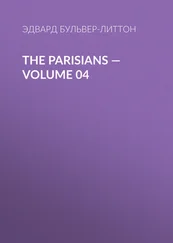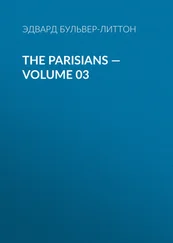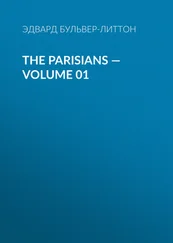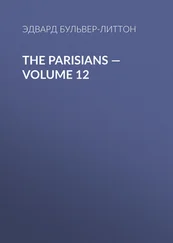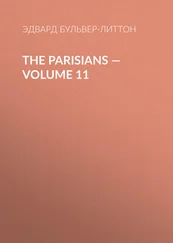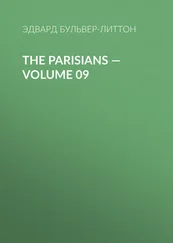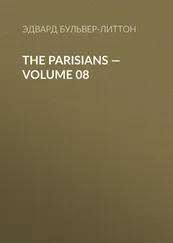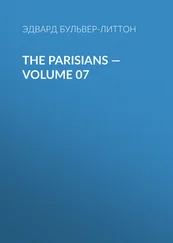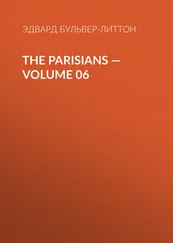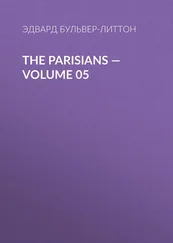Эдвард Бульвер-Литтон - The Parisians — Complete
Здесь есть возможность читать онлайн «Эдвард Бульвер-Литтон - The Parisians — Complete» — ознакомительный отрывок электронной книги совершенно бесплатно, а после прочтения отрывка купить полную версию. В некоторых случаях можно слушать аудио, скачать через торрент в формате fb2 и присутствует краткое содержание. Жанр: foreign_prose, literature_19, Европейская старинная литература, foreign_antique, на английском языке. Описание произведения, (предисловие) а так же отзывы посетителей доступны на портале библиотеки ЛибКат.
- Название:The Parisians — Complete
- Автор:
- Жанр:
- Год:неизвестен
- ISBN:нет данных
- Рейтинг книги:5 / 5. Голосов: 1
-
Избранное:Добавить в избранное
- Отзывы:
-
Ваша оценка:
- 100
- 1
- 2
- 3
- 4
- 5
The Parisians — Complete: краткое содержание, описание и аннотация
Предлагаем к чтению аннотацию, описание, краткое содержание или предисловие (зависит от того, что написал сам автор книги «The Parisians — Complete»). Если вы не нашли необходимую информацию о книге — напишите в комментариях, мы постараемся отыскать её.
The Parisians — Complete — читать онлайн ознакомительный отрывок
Ниже представлен текст книги, разбитый по страницам. Система сохранения места последней прочитанной страницы, позволяет с удобством читать онлайн бесплатно книгу «The Parisians — Complete», без необходимости каждый раз заново искать на чём Вы остановились. Поставьте закладку, и сможете в любой момент перейти на страницу, на которой закончили чтение.
Интервал:
Закладка:
“Fate,” answered Graham, slowly and thoughtfully, “Fate, which is not the ruler but the servant of Providence, decides our choice of life, and rarely from outward circumstances. Usually the motive power is within. We apply the word ‘genius’ to the minds of the gifted few; but in all of us there is a genius that is inborn, a pervading something which distinguishes our very identity, and dictates to the conscience that which we are best fitted to do and to be. In so dictating it compels our choice of life; or if we resist the dictate, we find at the close that we have gone astray. My choice of life thus compelled is on the stony thoroughfares, yours in the green fields.”
As he thus said, his face became clouded and mournful. The Venosta, quickly tired of a conversation in which she had no part, and having various little household matters to attend to, had during this dialogue slipped unobserved from the room; yet neither Isaura nor Graham felt the sudden consciousness that they were alone which belongs to lovers. “Why,” asked Isaura, with that magic smile reflected in countless dimples which, even when her words were those of a man’s reasoning, made them seem gentle with a woman’s sentiment,—“why must your road through the world be so exclusively the stony one? It is not from necessity, it can not be from taste; and whatever definition you give to genius, surely it is not your own inborn genius that dictates to you a constant exclusive adherence to the commonplace of life.”
“Ah, Mademoiselle, do not misrepresent me. I did not say that I could not sometimes quit the real world for fairyland,—I said that I could not do so often. My vocation is not that of a poet or artist.”
“It is that of an orator, I know,” said Isaura, kindling; “so they tell me, and I believe them. But is not the orator somewhat akin to the poet? Is not oratory an art?”
“Let us dismiss the word orator; as applied to English public life, it is a very deceptive expression. The Englishman who wishes to influence his countrymen by force of words spoken must mix with them in their beaten thoroughfares; must make himself master of their practical views and interests; must be conversant with their prosaic occupations and business; must understand how to adjust their loftiest aspirations to their material welfare; must avoid as the fault most dangerous to himself and to others that kind of eloquence which is called oratory in France, and which has helped to make the French the worst politicians in Europe. Alas! Mademoiselle, I fear that an English statesman would appear to you a very dull orator.”
“I see that I spoke foolishly,—yes, you show me that the world of the statesman lies apart from that of the artist. Yet—”
“Yet what?”
“May not the ambition of both be the same?”
“How so?”
“To refine the rude, to exalt the mean; to identify their own fame with some new beauty, some new glory, added to the treasure-house of all.”
Graham bowed his head reverently, and then raised it with the flush of enthusiasm on his cheek and brow.
“Oh, Mademoiselle,” he exclaimed, “what a sure guide and what a noble inspirer to a true Englishman’s ambition nature has fitted you to be, were it not—” He paused abruptly.
This outburst took Isaura utterly by surprise. She had been accustomed to the language of compliment till it had begun to pall, but a compliment of this kind was the first that had ever reached her ear. She had no words in answer to it; involuntarily she placed her hand on her heart as if to still its beatings. But the unfinished exclamation, “Were it not,” troubled her more than the preceding words had flattered, and mechanically she murmured, “Were it not—what?”
“Oh,” answered Graham, affecting a tone of gayety, “I felt too ashamed of my selfishness as man to finish my sentence.”
“Do so, or I shall fancy you refrained lest you might wound me as woman.”
“Not so; on the contrary, had I gone on it would have been to say that a woman of your genius, and more especially of such mastery in the most popular and fascinating of all arts, could not be contented if she inspired nobler thoughts in a single breast,—she must belong to the public, or rather the public must belong to her; it is but a corner of her heart that an individual can occupy, and even that individual must merge his existence in hers, must be contented to reflect a ray of the light she sheds on admiring thousands. Who could dare to say to you, ‘Renounce your career; confine your genius, your art, to the petty circle of home’? To an actress, a singer, with whose fame the world rings, home would be a prison. Pardon me, pardon—”
Isaura had turned away her face to hide tears that would force their way; but she held out her hand to him with a childlike frankness, and said softly, “I am not offended.” Graham did not trust himself to continue the same strain of conversation. Breaking into a new subject, he said, after a constrained pause, “Will you think it very impertinent in so new an acquaintance, if I ask how it is that you, an Italian, know our language as a native; and is it by Italian teachers that you have been trained to think and to feel?”
“Mr. Selby, my second father, was an Englishman, and did not speak any other language with comfort to himself. He was very fond of me; and had he been really my father I could not have loved him more. We were constant companions till—till I lost him.”
“And no mother left to console you!”
Isaura shook her head mournfully, and the Venosta here re-entered. Graham felt conscious that he had already stayed too long, and took leave.
They knew that they were to meet that evening at the Savarins’.
To Graham that thought was not one of unmixed pleasure; the more he knew of Isaura, the more he felt self-reproach that he had allowed himself to know her at all.
But after he had left, Isaura sang low to herself the song which had so affected her listener; then she fell into abstracted revery, but she felt a strange and new sort of happiness. In dressing for M. Savarin’s dinner, and twining the classic ivy wreath in her dark locks, her Italian servant exclaimed, “How beautiful the Signorina looks to-night!”
CHAPTER III
M. Savarin was one of the most brilliant of that galaxy of literary men which shed lustre on the reign of Louis Philippe.
His was an intellect peculiarly French in its lightness and grace. Neither England nor Germany nor America has produced any resemblance to it. Ireland has, in Thomas Moore; but then in Irish genius there is so much that is French.
M. Savarin was free from the ostentatious extravagance which had come into vogue with the Empire. His house and establishment were modestly maintained within the limit of an income chiefly, perhaps entirely, derived from literary profits.
Though he gave frequent dinners, it was but to few at a time, and without show or pretence. Yet the dinners, though simple, were perfect of their kind; and the host so contrived to infuse his own playful gayety into the temper of his guests, that the feasts at his house were considered the pleasantest at Paris. On this occasion the party extended to ten, the largest number his table admitted.
All the French guests belonged to the Liberal party, though in changing tints of the tricolor. Place aux dames! first to be named were the Countess de Craon and Madame Vertot, both without husbands. The Countess had buried the Count, Madame Vertot had separated from Monsieur. The Countess was very handsome, but she was sixty; Madame Vertot was twenty years younger, but she was very plain. She had quarrelled with the distinguished author for whose sake she had separated from Monsieur, and no man had since presumed to think that he could console a lady so plain for the loss of an author so distinguished.
Читать дальшеИнтервал:
Закладка:
Похожие книги на «The Parisians — Complete»
Представляем Вашему вниманию похожие книги на «The Parisians — Complete» списком для выбора. Мы отобрали схожую по названию и смыслу литературу в надежде предоставить читателям больше вариантов отыскать новые, интересные, ещё непрочитанные произведения.
Обсуждение, отзывы о книге «The Parisians — Complete» и просто собственные мнения читателей. Оставьте ваши комментарии, напишите, что Вы думаете о произведении, его смысле или главных героях. Укажите что конкретно понравилось, а что нет, и почему Вы так считаете.

